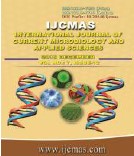


 National Academy of Agricultural Sciences (NAAS)
National Academy of Agricultural Sciences (NAAS)

|
PRINT ISSN : 2319-7692
Online ISSN : 2319-7706 Issues : 12 per year Publisher : Excellent Publishers Email : editorijcmas@gmail.com / submit@ijcmas.com Editor-in-chief: Dr.M.Prakash Index Copernicus ICV 2018: 95.39 NAAS RATING 2020: 5.38 |
Twenty three simple sequence repeat markers were used to study genetic relationship among fifty three rice varieties developed from Andhra Pradesh and Telangana states. All markers were polymorphic among 53 varieties. A total of 55 alleles were produced for 23 markers with fragment size ranging from 60bp (RM204) to 470bp (RGNMS1289). The number of alleles per marker were ranged from two (RM262) to four (RGNMS1776) with an average of 2.39 alleles/loci. The PIC value for this set of markers varied from 0.213 (RM5474) to 0.670 (RM152), while the gene diversity ranged from 0.228 (RM5474) to 0.720 (RM152). Cluster analysis revealed a total of four distinct clusters resulted out of analysis of pooled SSR marker data. First cluster contains eleven varieties, most of them released from ARI, Rajendranagar, Hyderabad. Second cluster was further divided into two sub-clusters, the varieties grouped into cluster IIa commonly had Mahsuri as one of the parents and cluster IIb had mostly varieties released from Maruteru and Warangal. The cluster III contained seven varieties, most of them developed from Maruteru and cluster IV had only two varieties i.e., Sumati and Nellore Mahsuri having a common character of very long slender grain type. Four SSR loci produced variety specific unique alleles for five varieties, which will be useful in in identification of these varieties. The results in the present study will be useful in understanding molecular variability of the varieties developed and in diversifying the genetic base of rice breeding program, identification of rice varieties in protection of IPR.
 |
 |
 |
 |
 |